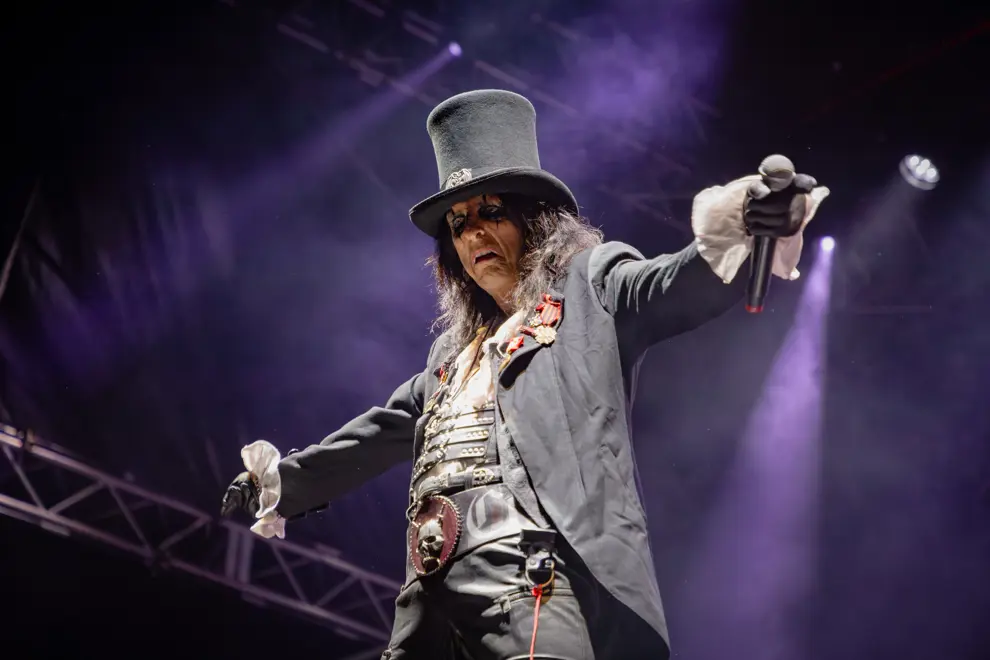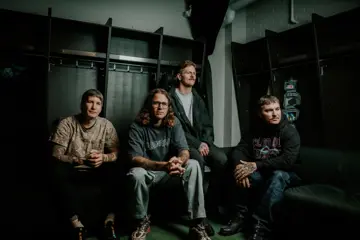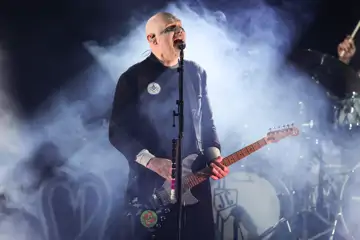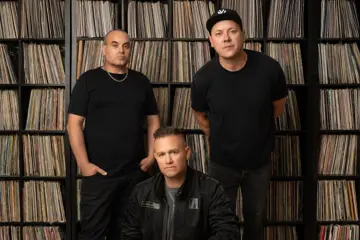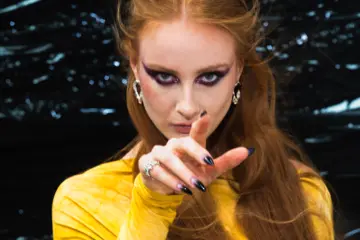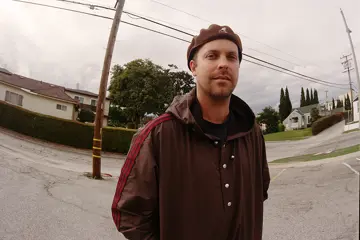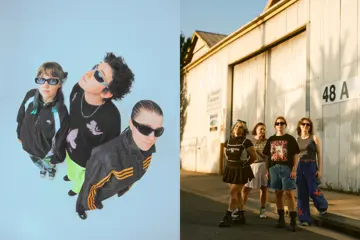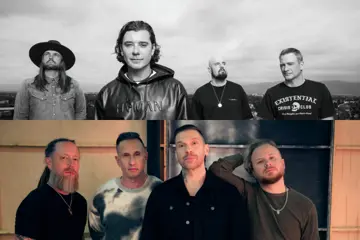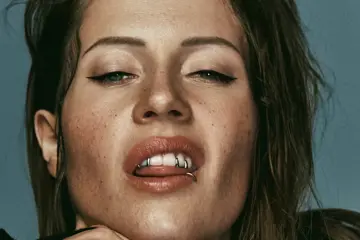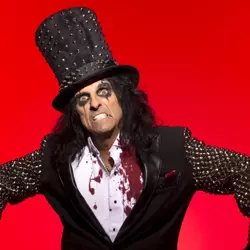 Alice Cooper
Alice CooperFifty years ago, Alice Cooper was scheduled to tour Australia for the first time.
Only problem was, the man in charge of granting visas – Clyde Cameron, the then Minister for Labour and Immigration in the Whitlam Government – was not a fan.
In fact, he called Alice’s performances “sick”.
“I am not going to allow a degenerate who could powerfully influence the young and weak-minded to enter this country and stage this sort of exhibition here,” Cameron hollered in March 1975.
“From what I have heard of this person’s performances, they are barbaric and primitive.
“Anybody who carries out mutilation of birds and animals on stage is sick and is not going to get into this country.”
The ban surprised the shock rocker. “Isn’t that crazy?” Alice responded. “People still think I kill chickens onstage.”
He defended his show, saying: “I have never done anything nearly as bloody as King Lear or Macbeth – and that’s considered required reading in every high school.”
The Aussie ban had its genesis in the infamous “chicken incident”, which happened at the Toronto Rock And Roll Revival festival in 1969, a few months after the Alice Cooper band released their debut album Pretties For You. Somehow, a live chicken appeared on the stage during Alice’s set. Thinking the bird could fly, Alice threw it into the crowd. Unfortunately, the chicken didn’t survive.
The resulting headline in the paper was: “Alice bites head off chicken and drinks the blood”.
When Frank Zappa called Alice to ask if the story was true, he offered some advice: “Whatever you do, don’t tell anyone you didn’t do it … you’re now the most notorious character in rock. You can’t buy this type of publicity!”
Don't miss a beat with our FREE daily newsletter
Alice’s act always polarised music fans. American music manager Ron Stone, who worked at Geffen and Roberts Management alongside David Geffen, Elliot Roberts and Irving Azoff, remembers going to one of his early shows at the Whisky A Go Go in Los Angeles.
“His manager, Shep Gordon, took me to see him. There were about 150 people there and almost everybody left – in the middle of his show. And Shep was convinced he was going to be a huge star, because no one was complacent, no one was unaffected – he drove every single person out of that room.
“And Shep correctly interpreted this information as saying that Alice was going to be a big star. He got a violent, angry reaction, and Shep said, ‘I know what to do with that.’ And he did.”
Welcome To My Nightmare, released 50 years ago, was Alice Cooper’s first solo album after the dissolution of the Alice Cooper band.
“Any time you break away from a band and you’re out on your own, you have to come up with something special,” Alice explains. “I had an idea for something. I said, ‘What if you were having a nightmare and you couldn’t wake up?’
“It was the story of Steven – Welcome To My Nightmare.”
The Welcome To My Nightmare show featured dancing skeletons, seven-foot spiders, a 20-foot spider web, guillotines and gallows, and a duet with a python.
The Aussie ban was overturned by Clyde Cameron’s successor, Senator Jim McClelland, and the Nightmare tour finally made it to Australia in March 1977.
The 11 shows sold out in just five hours.
Alice’s arrival coincided with ABBA’s one and only Australian visit. Alice was surprised to find thousands of kids outside his Perth hotel. In his jetlagged state, he thought they were chanting “Alice”. Only later did he realise they were yelling for ABBA.
In Melbourne, Alice turned up on Countdown with Little River Band’s Glenn Shorrock.
As Clyde Cameron predicted, Alice Cooper had a powerful influence on the young.
James Young – the owner of Cherry Bar, Melbourne’s home of rock ’n’ roll – was just 11 when his mum took him to see Alice Cooper at Festival Hall in March 1977. The ticket cost $7; it was Young’s first gig.
“We were in the 14th row, right in the middle,” he recalls, as if the gig were yesterday. “The curtains opened and there was the giant cyclops, the huge guillotine, the black widow spiders, with Vincent Price doing the voiceover. And then out comes Alice Cooper.
“I thought, ‘Bang, I think this is me sorted for the rest of my life.’”
The Welcome To My Nightmare tour was also the first concert for The Go-Betweens’ Amanda Brown, who was also 11. “A girlfriend’s mother kindly offered to take us. We put on makeup and had a great time. We really went with the theatre of it all. I liked his rebellious side, and I liked the music as well.”
Alice was also an inspiration for Brian Mannix and Uncanny X-Men. “I was always a big fan of Alice Cooper,” Brian admits. “So, for the Cos Life Hurts tour, I had two big machetes made. In the handle was a tube filled with fake blood. When I squeezed the handle, the fake blood would travel up a tube and spurt out an opening in the blade. I would run the blade across my wrists, squeeze, and blood would spurt out like I had cut open an artery.
“It scared the shit out of some fans. I thought it was terrific.”
To balance the chilling tracks on Welcome To My Nightmare – including Cold Ethyl, a light-hearted look at necrophilia – Cooper crafted a sensitive ballad called Only Women Bleed. “We had a lot of strange, nightmarish songs, really scary little tunes,” he notes. “We needed something that would really stick out, that people would think, ‘Wow, what part of the nightmare is this?’
“So we wrote Only Women Bleed, meaning that women bleed emotionally, whereas men don’t as much. It was taken wrong by a lot of people, but it became my most-covered song. And it’s one of my favourite songs.”
The ballerina in Only Women Bleed on the Welcome To My Nightmare tour, Sheryl Goddard, became Alice’s wife. They have been married for 49 years.
After hearing Cold Ethyl, the American agony aunt Ann Landers labelled Alice’s work “filth”. So, Alice sent her a letter. “I’m really sorry you found that old song of mine crude and offensive,” he wrote. “The point I want to make is that the kids are not bothered by this – their parents are. The kids see the song and gruesome antics, like with the guillotine, for exactly what it is – satire, done with a sense of humour to a rock ’n’ roll beat.
“The kids know I am harmless. It’s their parents that make me out to be some kind of a monster.”
But Landers urged Alice to clean up his act. “I like satire as much as the next person, but chopping off heads and spurting blood all over the place is not my idea of entertainment.”
Explaining his act, the godfather of shock rock said, “I project images to the audience, and they make up their own story to fit it. I have no message at all. I never did.”
The Nightmare album featured Department Of Youth, which, Alice says, was “just a great big anthem”.
“I don’t remember what the idea was, except the very first chord was totally inspired by Pete Townshend – it just opened the whole thing up.”
The song also mentioned Donny Osmond: “We got the power … Who gave it to you? Donny Osmond! What?!”
“At the time, Donny was the teen heartthrob.” Alice smiles. “I have seen him since then and he said, ‘Thank you for mentioning me on your album.’”
Alice – who was born Vincent Furnier – turned 77 this year.
For his new record – his 30th studio album – Alice has put the Alice Cooper band back together. The Revenge of Alice Cooper, out July 25, features original bass player Dennis Dunaway, drummer Neal Smith and guitarist Michael Bruce.
Since releasing Elected in 1972, Alice has also jokingly run for President every four years.
In 2016, he pledged to “Make America Sick Again”. At last year’s election, he promised to “Make America Rock Again”, claiming he was “a troubled man for troubled times”.
Despite his initial ban, Alice Cooper has now done 13 Australian tours, and he’s had eight Top 10 albums.
Alice was drinking heavily on that first Australian tour. The son of a preacher man, Alice turned to religion to help beat the bottle. He’s been sober for 42 years.
He says, “You don’t have to be drunk to be punk.”
“Drinking beer is easy,” he adds. “Trashing your hotel room is easy. But being a Christian, that’s a tough call. That’s rebellion.”
Old Labor records show that Clyde Cameron’s advisers disagreed with the Alice ban. John Bannon – who later became the Premier of South Australia – was Cameron’s senior adviser. Twenty years after Alice’s visa refusal, Cameron officially apologised to Bannon “for the hurt I caused by opposing his [Alice Cooper’s] entry into Australia.
“You always gave me an honest opinion, and when I felt unable to support your view, you never once sought to later undermine my decision.”
Cameron never apologised to Alice, but the rocker laughed when I reminded him of the ban. “It seems stupid now,” he said. “But I guess those were the times.
“I was on the cover of every magazine. I was Marilyn Manson times 10. I was the Antichrist. I was the reason for Vietnam, I was probably a suspect in the JFK shooting. Everything that went wrong was somehow blamed on Alice Cooper.”
Fast forward five decades and Alice Cooper is now quoted in parliament – in a positive way. In 2017, when speaking about proposed ticket-scalping legislation, Sharon Knight, the Labor member for Wendouree in Victoria’s state parliament, spoke about seeing Alice at Rod Laver Arena. “Ace Frehley just shredded the place, and then out came Alice Cooper,” she noted. “It was great, it was fantastic.”
From villain to rock hero, it’s the remarkable tale of Alice in Downunderland.

